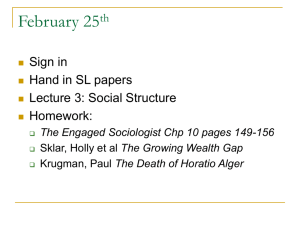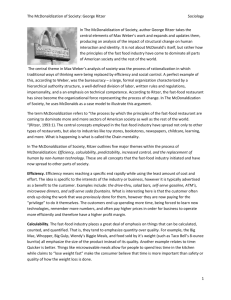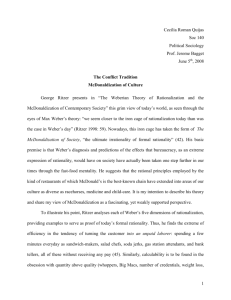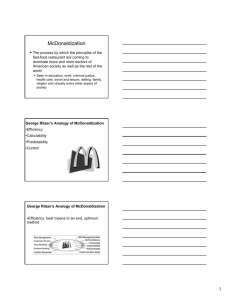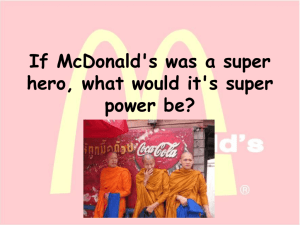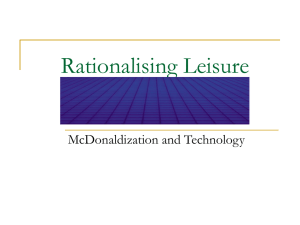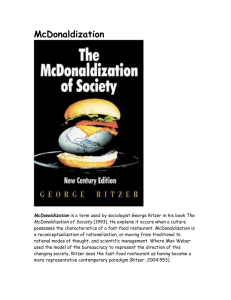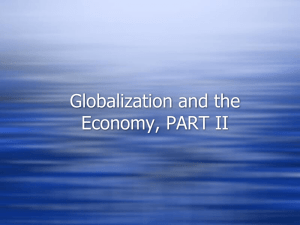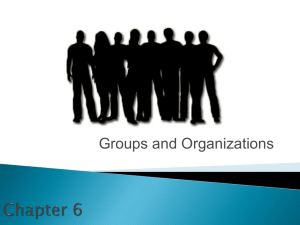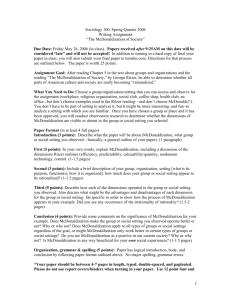The McDonaldization of society
advertisement
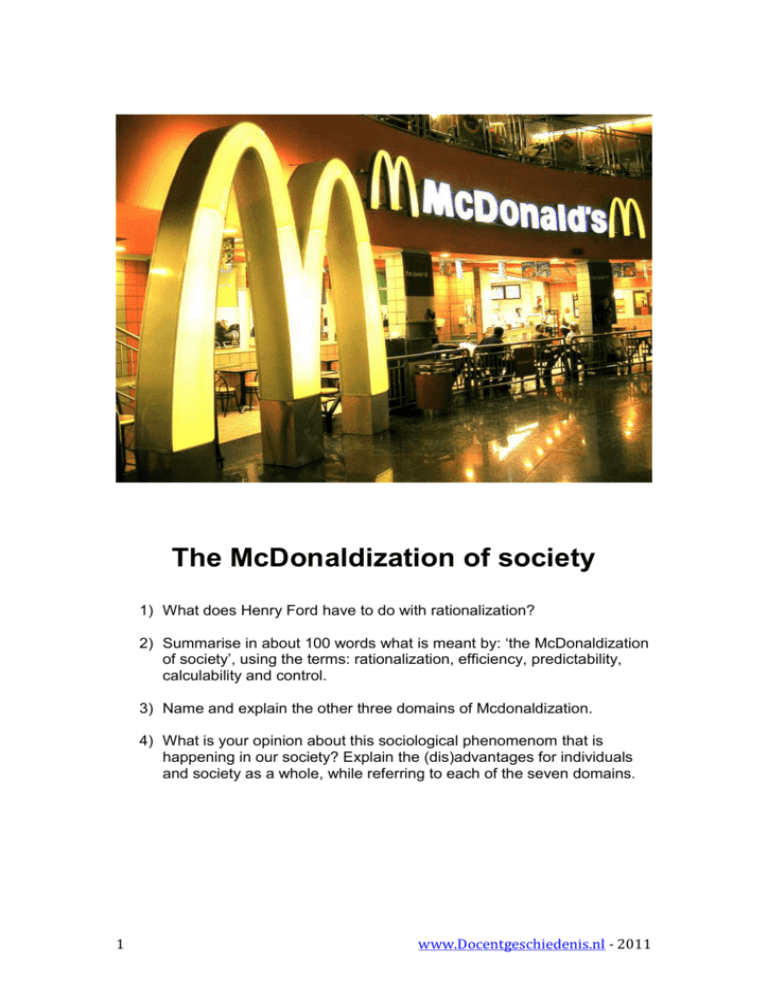
The McDonaldization of society 1) What does Henry Ford have to do with rationalization? 2) Summarise in about 100 words what is meant by: ‘the McDonaldization of society’, using the terms: rationalization, efficiency, predictability, calculability and control. 3) Name and explain the other three domains of Mcdonaldization. 4) What is your opinion about this sociological phenomenom that is happening in our society? Explain the (dis)advantages for individuals and society as a whole, while referring to each of the seven domains. 1 www.Docentgeschiedenis.nl - 2011 McDonaldization is the term invented by George Ritzer to describe a sociological phenomenom that is happening in our society. You may think it started with Ray Kroc in the 1950's when he bought his first hamburger restaurant, but it's origins were actually much earlier than that. In fact, Henry Ford was the first McDonaldization pioneer with his vision of an assembly line for improving the production of automobiles. His revolutionary idea dramatically changed how many automobiles could be produced and was very efficient. Rationalization In essence, McDonaldization is the process of rationalization, albiet taken to extreme levels. Rationalization is a sociological term that simply means the substitution of logically consistent rules for traditional (or illogical) rules. One of the fundamental aspects of McDonaldization is that almost any task can (and should) be rationalized. The process of McDonaldization takes a task and breaks it down into smaller tasks. This is repeated until all tasks have been broken down to the smallest possible level. The resulting tasks are then rationalized to find the single most efficient method for completing each task. All other methods are then deemed inefficient and discarded. The result is an efficient, logical sequence of methods that can be completed the same way every time to produce the desired outcome. The outcome is predictable. All aspects of the process are easily controlled. Additionally, quantity (or calculability) becomes the measurement of good performance. According to Ritzer, the four main dimensions of McDonaldization are: 2 Efficiency - The optimum method of completing a task. The rational determination of the best mode of production. Individuality is not allowed. Calculability- Assessment of outcomes based on quantifiable rather than subjective criteria. In other words, quantity over quality. They sell the Big Mac, not the Good Mac. Predictability - The production process is organized to guarantee uniformity of product and standardized outcomes. All shopping malls begin to look the same and all highway exits have the same assortment of businesses. Control - The substitution of more predictable non-human labor for human labor, either through automation or the deskilling of the work force. www.Docentgeschiedenis.nl - 2011 Efficiency Efficiency is the process of "...choosing the optimum means to a given end". Efficiency is something that is sought after by many people, even without the shackles of McDonaldization. The difference is that in a McDonaldized society, efficiency is thrust upon a person, so instead of choosing your own methods of efficiency, you are forced to accept the efficiency of the surrounding institutions. In fact this can lead to a lamb-like acceptance of what the surrounding institutions consider efficient. Which may be vastly different from what would actually be efficient for either the employees or the consumer. Ritzer uses the examples of salad bars: in essence, with a salad bar, you buy an empty plate, go to the bar and create the salad yourself. This is very efficient for the restaurant, but makes more work for the consumer. In other words you have to pay for the privilege of making your own salad. Another example of this inefficient efficiency is the ATM machine, popular at many banks. The consumer has to fill out all of the paper work, enter in the deposit or withdrawal to the computer, and, on top of all this, pay for the privilege of being a bank teller. Many would argue that both the salad bar, and the ATM are conveniences, rather than inconveniences. With the salad bar, you are not limited by what the cook wants to put in the salad, and ATMs allow you to do your banking any time you want, unhindered by inefficient bank hours. However, keep in mind, that both of these serve to reduce the level of human interaction. Consumers are forced to deal with computers or salad bars and not people, training them to be better workers for the McDonaldized society. Calculability I like big things The size of them impresses me Just give me plenty Forget about the quality And I like fast food The burgers always taste the same No snotty waiters, Escargot or Beaujolais Music Time - Dennis DeYoung/Styx Actually, Dennis mentions two of McDonaldization's themes in this song. "The burgers always taste the same" is a reference to predictability. "Big things," however, is calculability all the way. He just mentioned two out of the four main dimensions of McDonaldization without even trying. The second aspect of McDonaldization is calculability. Calculability is " ... an emphasis on the quantitative aspects of products sold (portion size, cost) and service offered (the time it takes to get the product).” Ritzer goes on to point out that this emphasis leads to the erroneous conclusion that more is better. If there is a lot of a product then it must be good. This is why we "super size" our "Double" Big Mac "extra" value meal. It is thought of as a better product. 3 www.Docentgeschiedenis.nl - 2011 Predictability As the term predictability would indicate, a McDonaldized society, "...emphasizes such things as discipline, order, systemization, formalization, routine, consistency, and methodical operation. In such a society, people prefer to know what to expect in most settings and at most times." This has a two-fold effect. It makes the experience of the consumer the same at every location of a McDonaldized company. It also makes the work routine for the employees of that company. Some people like this predictability, and would argue that it is a good thing, you don't have to worry about eating a bad burger. Burgers from one McDonald's to the next will taste the same. Workers, don't have to worry about thinking for themselves, they will have time to concentrate on other things, while they go through the motions of performing their jobs. But, is this predictability better? When you travel to a different area, do you want the experience to be the same? If you are in France, touring the city of Paris, do you really want to eat at McDonald's? Doesn't that detract from the whole experience of a different culture? It is true, many employees don't want to have to think while they are working, but isn't a job that is challenging better? This predictability has spilled over into more than just jobs and food. The most popular movies out today are sequels. Sequels are great, because they are almost assured to make money for the studio, writer's don't have to work as hard, because the characters have already been developed. Consumer's love them because they also don't have to think. The moviegoer is usually familiar with the characters in the sequel and knows what to expect, making the movie experience more of a passive one. Television is even more infamous for its predictability. It has been said that there are only 40 different sitcom situations, and have been since the 1960's. These situations are used over and over again, from one sitcom to the next, without fail. Occasionally a new plot will be introduced, but next week it is back to the same old situations. Next time you are watching your favorite sitcom, think of these experiences, and think to see if it is being done, or has been done on your show: Sitcom family or group goes camping. One member of the sitcom family or group feels unloved, or unneeded and the rest of the episode is spent convincing that person he or she is a necessary part of the family. One member of the sitcom family borrows another member's car (usually child borrowing parent's) and gets into an accident with it. The person who borrowed the car tries to cover it up. A member of the cast is forced to get a job in a fast-food restaurant. A cast member (usually the resident "nerd") gets to be the hero. A female member of the cast gets pregnant. The same female cast member will eventually go to the hospital to have the baby. One of the children of the sitcom family attempts to move out on his or her own, only to find out the he or she still needs the family, and moves back home. If you can recognize these plots from more than one sitcom, then you, hopefully, can see what is meant by the predictability of television. 4 www.Docentgeschiedenis.nl - 2011 Control The fourth aspect of McDonaldization is control. Control over both employees and customers because, " people are the great source of uncertainty, unpredictability and inefficiency in any rationalizing system...". By increasing control, through increased mechanization, employers maintain a better control over the entire rationalization process. Ritzer's focus involves control through the substitution of non-human for human technology. By making tasks repetitive and forcing employees not to think, employers can maintain a tighter control over them. Then we go home, and the money we take from the bank is decided by the computer. Our meals are frozen, we microwave our popcorn (our microwaves even have "popcorn" buttons on them, so the popcorn is perfect every time), and our salads come pre-made in bags--just open and pour. Pilots have begun to rely more and more on automated systems, Hertz Rent-A-Car is installing computerized maps in their cars, and scientists are experimenting with cars that have built-in guides all in a futile attempt to eliminate the fear that accidents will occur due to human error. However, each of these "advances" becomes a step back. We are in less control and computers are in more control As things become more automated it is easier to replace workers, and as we spend more time on front of the television and less time thinking for ourselves. We become more dependent on the very things that McDonaldization creates. 5 www.Docentgeschiedenis.nl - 2011 Other dimensions of McDonaldization By now, you might be thinking that this all sounds pretty good. After all, being more efficient is a good thing. Controlled, consistent and measurable outcomes also sound good. So, what's the problem? It turns out that over-rationalizing a process in this manner has an unexpected side effect. It's called irrationality. In a sociological context that simply means that a rationalized system may result in events or outcomes that were neither anticipated or desired, and in fact, may not be so good. Take the example of the McDonald's chain of restaurants. Where is the irrationality? The premise of fast food often turns out to be just the opposite - long waits in lines. Fast food is not necessarily good food - in fact, McDonald's food is extremely unhealthy and the taste is average and bland. The system of efficiently producing and distributing their food has some other consequences, namely millions of tons of trash each year (disposability) and a food cultivation system of questionable ethics. There are other dimensions of McDonaldization that Ritzer didn't include with the main four, but are worthy enough for prime attention. They are: 6 Irrationality - A side effect of overrationalized systems. Ritzer himself hints that this is the fifth dimension of McDonaldization. An example of this could be workers on an assembly line that are hired and trained to perform a single highly rationalized task. Although this may be a very efficient method of operating a business, an irrationality that is spawned can be worker burnout. Deskilling - A work force with the minimum abilities possible to complete simple focused tasks. This means that they can be quickly and cheaply trained and are easily replaceable. Consumer Workers - One of the sneakiest things about McDonaldization is how consumers get tricked into becoming unpaid employees. They do the work that was traditionally performed by the company. The prime example of this is diners who bus their own tables at the fast food restaurant. They dutifully carry their trash to friendly receptacles marked "thank you." (The extreme rationalization of this is the drive-thru; consumers take their trash with them!) Other examples are many and include: ATM's, salad bars, automated telephone menus, and pumping gas. www.Docentgeschiedenis.nl - 2011

